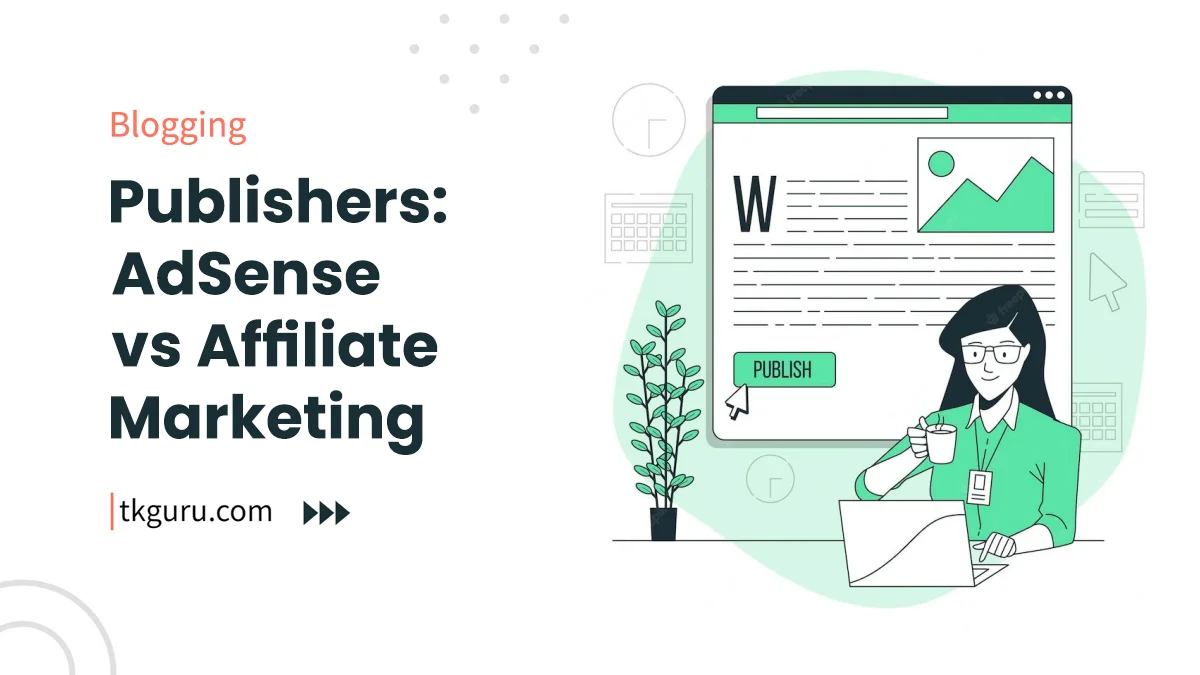Advertisements
Ratings

AdSense vs Affiliate Marketing: Publisher – For online publishers seeking to monetize their websites, the choice between AdSense and affiliate marketing is a pivotal decision.
Both strategies offer unique benefits and considerations, impacting revenue generation and audience engagement.
In this comprehensive guide, we’ll delve into the details of AdSense and affiliate marketing, compare their advantages and disadvantages, and help publishers make an informed choice based on their goals and audience.
Contents
Exploring AdSense
Google AdSense is a widely adopted method for publishers to earn revenue by displaying ads on their websites.
Publishers earn income based on the number of ad impressions and clicks generated by their audience.
Table: Pros and Cons of AdSense
| Pros | Cons |
|---|---|
| Predictable revenue based on ad impressions | Lower earnings per click compared to affiliate marketing |
| No direct sales effort required | Limited control over ads displayed |
| Suitable for various content types |
Advantages of AdSense
AdSense offers publishers a predictable revenue stream based on the number of ad impressions their website receives.
This makes it a reliable option for those seeking consistent income. Moreover, AdSense does not require direct sales efforts, allowing publishers to focus on creating quality content.
Disadvantages of AdSense
However, the earnings per click in AdSense tend to be lower than those achievable through affiliate marketing.
Additionally, publishers have limited control over the ads displayed on their website, which might not always align with the content or audience preferences.
Exploring Affiliate Marketing
Affiliate marketing involves promoting products or services through unique affiliate links. Publishers earn a commission for each successful sale generated through their referral.
Table: Pros and Cons of Affiliate Marketing
| Pros | Cons |
|---|---|
| Potential for higher earnings per sale | Earnings depend on successful conversions |
| Control over promoted products and content alignment | Requires more effort in product research and promotion |
| Opportunity to align with audience interests |
Advantages of Affiliate Marketing
Affiliate marketing holds the potential for publishers to earn higher commissions per sale compared to AdSense clicks.
Publishers have control over the products they choose to promote, allowing for content alignment and catering to audience interests.
Disadvantages of Affiliate Marketing
However, affiliate marketing relies on successful conversions, making earnings directly dependent on the audience’s purchasing decisions.
Additionally, promoting affiliate products requires more effort in terms of product research, crafting compelling recommendations, and maintaining transparent disclosure.
Pros and Cons of AdSense
Advantages of AdSense
AdSense is favored by publishers for its reliability in generating a steady stream of income.
The predictable revenue based on ad impressions provides stability, and publishers can focus on creating content without the need for direct sales efforts.
Disadvantages of AdSense
The earnings from AdSense clicks are generally lower compared to affiliate marketing commissions.
Furthermore, publishers have limited control over the types of ads displayed, which might not always align perfectly with their website’s content.
Pros and Cons of Affiliate Marketing
Advantages of Affiliate Marketing
Publishers benefit from higher earnings per sale through affiliate marketing. Successful conversions lead to substantial commissions, making it a lucrative strategy.
Moreover, publishers have control over the products they promote, allowing for content alignment and personalized recommendations.
Disadvantages of Affiliate Marketing
Affiliate marketing’s main challenge is the dependence on successful conversions. If the audience doesn’t make purchases through the provided affiliate links, the revenue potential is limited.
Additionally, promoting affiliate products requires more effort in terms of product research, crafting persuasive recommendations, and maintaining transparent disclosure.
Choosing the Right Strategy
When making the decision between AdSense and affiliate marketing, several factors come into play:
1. Audience Demographics and Interests
- AdSense: Effective for websites with diverse audiences and varied interests.
- Affiliate Marketing: Ideal when your audience has specific preferences, as you can align promotions with their needs.
2. Content Type and Niche
- AdSense: Suitable for a wide range of content types and niches.
- Affiliate Marketing: More effective when your content naturally integrates with relevant products or services.
3. Resource Allocation and Effort
- AdSense: Requires consistent content creation to maximize ad impressions.
- Affiliate Marketing: Requires additional effort in product research, crafting persuasive recommendations, and aligning content with promotions.
4. Personal Preferences and Goals
- AdSense: Fits publishers seeking a stable income without direct sales efforts.
- Affiliate Marketing: Appeals to those who enjoy exploring products, creating recommendations, and earning from successful conversions.
Case Studies
Case Study 1: AdSense Success for Lifestyle Blog A
Publisher A runs a lifestyle blog that covers various topics, including fashion, travel, health, and personal development. The diverse range of content attracts a broad audience interested in various aspects of modern living.
Channel Focus and Content Strategy:
- Publisher A maintains a consistent posting schedule, publishing multiple articles each week.
- The content spans a wide range, from fashion tips to travel guides, appealing to a diverse readership.
AdSense Monetization Approach:
- The blog’s comprehensive content leads to a high volume of visitors and pageviews.
- AdSense ads are strategically placed within articles and on the sidebar.
Advantages of AdSense for Publisher A:
- Predictable Revenue: Publisher A benefits from a steady income due to a significant number of ad impressions.
- Diverse Audience: The broad content spectrum attracts visitors with varying interests, resulting in diverse ad topics.
Challenges of AdSense for Publisher A:
- Lower Earnings per Click: Despite high ad impressions, earnings from individual ad clicks remain relatively lower.
Case Study 2: Affiliate Marketing Triumph for Tech Website B
Publisher B operates a tech-focused website known for in-depth product reviews, tech tutorials, and the latest gadget updates.
Channel Focus and Content Strategy:
- Publisher B establishes authority by providing detailed reviews and analysis of tech products.
- The audience values the website’s insights and recommendations.
Affiliate Marketing Monetization Approach:
- Publisher B incorporates affiliate links within reviews and tutorials for relevant tech products.
- The website’s authority and trustworthiness result in a high conversion rate for affiliate sales.
Advantages of Affiliate Marketing for Publisher B:
- Higher Earnings per Sale: Publisher B benefits from significant commissions on each successful affiliate sale.
- Trustworthy Recommendations: The audience values Publisher B’s insights, leading to higher conversion rates.
Challenges of Affiliate Marketing for Publisher B:
- Conversion Dependence: The success of affiliate marketing depends on the audience’s willingness to make purchases.
Conclusion
These case studies shed light on the efficacy of AdSense and affiliate marketing strategies for different types of publishers.
Publisher A’s lifestyle blog flourishes with AdSense due to its diverse content, resulting in steady income from ad impressions.
On the other hand, Publisher B excels with affiliate marketing by leveraging its expertise in the tech niche to provide valuable product recommendations.
Tips for Effective Monetization
Monetizing your website through AdSense and affiliate marketing requires careful planning and strategic execution.
Here are some detailed tips to help you optimize your revenue potential while maintaining a user-friendly and trustworthy online experience.
1. Maximizing AdSense Earnings
1. Choose High CPC Keywords and Niches: Research and target high Cost Per Click (CPC) keywords and niches relevant to your content. Utilize tools like Google Keyword Planner to identify keywords with the potential to generate higher ad revenue.
2. Optimize Ad Placement: Experiment with various ad formats and placements to strike a balance between user experience and revenue. Test different ad sizes, positions, and types to find the optimal combination that doesn’t disrupt the user’s browsing experience.
3. Focus on Quality Content: Consistently produce high-quality, relevant content to increase traffic and ad impressions. Valuable content attracts more visitors, increasing the likelihood of higher ad engagement and earnings.
2. Successful Affiliate Marketing
4. Understand Your Audience: Thoroughly understand your audience’s preferences, needs, and pain points. Tailor your affiliate product choices to align with their interests, increasing the chances of conversion.
5. Choose Relevant Products: Research and select affiliate products that resonate with your content and audience. Promote products that genuinely add value to your readers’ lives and complement your content.
6. Craft Authentic Recommendations: Create compelling and authentic product recommendations. Explain how the product solves a problem or fulfills a need, and provide personal insights to build trust with your audience.
7. Leverage Product Demonstrations: Use videos, images, or detailed descriptions to demonstrate how the affiliate products work. Visual representations help your audience understand the product’s features and benefits.
3. Balancing AdSense and Affiliate Marketing
8. Diversify Your Revenue Streams: Consider integrating both AdSense and affiliate marketing to diversify your income sources. This approach reduces your reliance on a single strategy and increases the potential for overall earnings.
9. Maintain a Seamless User Experience: Strive to create a seamless browsing experience for your audience. Ensure that ads and affiliate promotions are non-intrusive and enhance the user’s engagement rather than interrupt it.
4. Analytics and Adaptation
10. Monitor Performance Metrics: Regularly track and analyze performance metrics for both AdSense and affiliate marketing. Keep an eye on metrics such as click-through rates, conversion rates, and revenue generated.
11. Adapt and Optimize: Based on the data collected, adapt your strategies accordingly. If certain affiliate products perform exceptionally well, consider creating more content around those products. If certain ad formats are effective, focus on implementing them across your site.
5. Transparency and Trust
12. Maintain Transparency: Transparency is crucial when it comes to both AdSense and affiliate marketing. Clearly disclose your affiliate relationships and ad placements to your audience to maintain their trust.
13. Provide Value First: Regardless of the monetization strategy, always prioritize providing value to your audience. When readers feel that your primary goal is to help them rather than make money, they are more likely to engage with your recommendations.
Conclusion
Effective monetization through AdSense and affiliate marketing requires a strategic and audience-centric approach.
By choosing high CPC keywords, optimizing ad placements, and delivering valuable content, you can enhance your AdSense revenue.
Similarly, understanding your audience, selecting relevant products, and crafting authentic recommendations contribute to successful affiliate marketing.
Remember, maintaining a balance between both strategies and prioritizing user experience and trust are key to sustainable and profitable monetization.
By continuously monitoring performance, adapting strategies, and always putting your audience first, you can create a monetization model that benefits both you and your readers.
Conclusion
The choice between AdSense and affiliate marketing ultimately hinges on your goals, audience, and content.
AdSense offers predictable revenue based on ad impressions, while affiliate marketing presents the potential for higher earnings through successful conversions.
Publishers often find success by striking a balance between both strategies, allowing them to diversify their income sources.
Regardless of the chosen approach, delivering value to your audience remains paramount for long-term success in the world of online publishing.
AdSense vs Affiliate Marketing: Publisher FAQs
What Is AdSense, and How Does It Work?
AdSense is an advertising program by Google that allows website owners to display Google ads on their sites. Website owners earn revenue when visitors click on these ads or view them (in the case of CPM ads). AdSense ads are automatically generated based on the website's content and audience.
What Is Affiliate Marketing, and How Does It Work?
Affiliate marketing is a performance-based marketing strategy where individuals or businesses (affiliates) promote products or services of other companies (merchants) and earn a commission for each sale or action generated through their unique affiliate links. Affiliates often use content, reviews, or promotions to drive traffic and conversions.
Which Is Easier to Set Up: AdSense or Affiliate Marketing?
AdSense is generally easier to set up because it only requires placing a code snippet on your website. Affiliate marketing may involve finding suitable affiliate programs, signing up, and creating content that effectively promotes the products or services.
Which Offers Higher Earning Potential: AdSense or Affiliate Marketing?
Affiliate marketing often offers higher earning potential because you can earn a percentage of the sale, which can be significant. AdSense earnings depend on various factors like website niche, traffic, and ad placement. While AdSense provides a steady income, affiliate marketing can lead to higher commissions with successful conversions.
Can I Use AdSense and Affiliate Marketing Together?
Yes, you can use AdSense and affiliate marketing together on your website. However, it's crucial to balance the two to avoid overwhelming your audience with ads and affiliate links. Ensure that your content remains valuable and relevant while using both monetization methods.
| Web Hosting | Website |
| WordPress | Google Adsense |
| SEO | Affiliate Marketing |
| Blogging | YouTube |
Recent Posts
- Windows vs Mac: Choosing the Ideal Laptop for Your Needs
- 10 Best Budget Friendly Laptops for Bloggers with Impressive Performance
- Top MacBook Models for Blogging Professionals
- 10 Best Laptops for Content Creators in 2023
Related Tags
Adsense vs affiliate marketing for youtube, Adsense vs affiliate marketing vs youtube, google adsense affiliate marketing, clickbank, amazon affiliate program, affiliate marketing income per month, shoutmeloud affiliate marketing, affiliate marketing earning proof,






